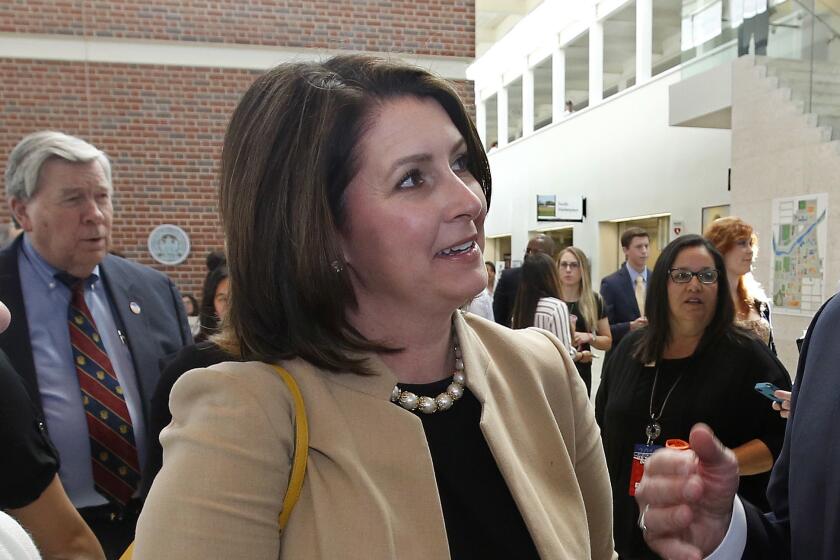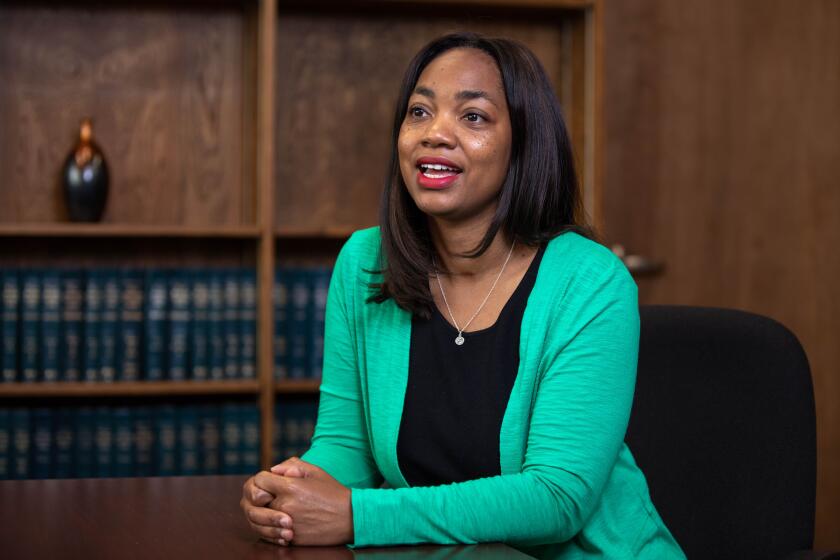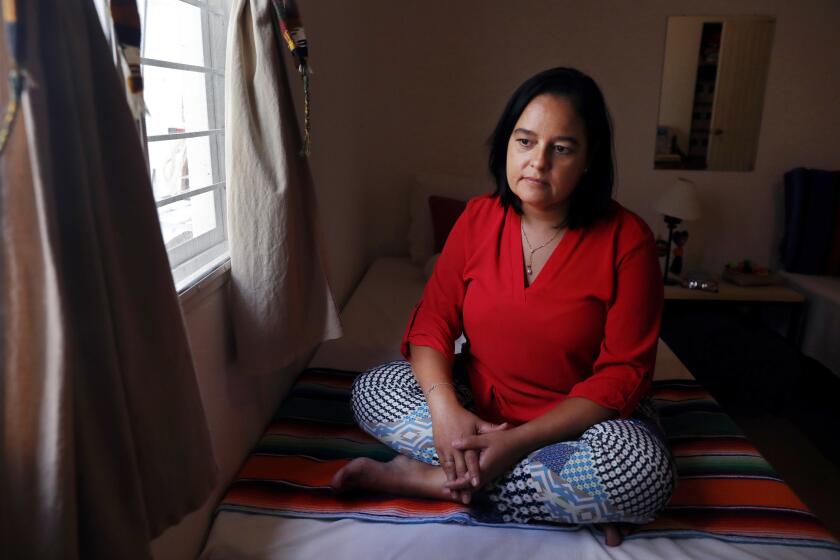Patients are barred from doctor disciplinary hearings in California. That could change

- Share via
SACRAMENTO — Tracy Dominguez has often thought about standing in the lobby of the Medical Board of California and shouting. Maybe then she would be heard, she said.
Since her pregnant 23-year-old daughter Demi died in 2019 while under the care of a Bakersfield doctor repeatedly reprimanded for negligence, according to Medical Board records, Dominguez has fought to have her family’s heartbreak considered in disciplinary hearings by the Medical Board. Instead, she said state law reduced her daughter to being called “Patient 1” in documentation given to the board members who discipline doctors. Her grandson Malakhi, delivered as Demi was dying, was described only as “a 4 lb 7 oz male infant” in the case against Dr. Arthur Park.
In December, the Medical Board allowed Park to avoid an administrative hearing and surrender his license with the ability to apply for reinstatement later. Park could not be reached for comment Thursday.
“This is a tragedy that no family should have to go through and then they make it so hard in the complaint process,” Dominguez said. “Our voices are not being heard.”
Senate Bill 920 by Sen. Melissa Hurtado (D-Sanger) would change that.
For nearly three decades, California law has forbidden the state Medical Board from considering victim statements in their decision making. Instead, a person filing a complaint to the Medical Board can provide a statement to a deputy attorney general assigned to their case, but those words are not allowed to be shared with board members who ultimately determine what discipline, if any, is warranted.
“People feel they don’t have a voice in the disciplinary process and they want to be able to tell their side and be heard,” Hurtado said. “I don’t think they are expecting everything to change overnight, but it is something they desperately want.”
The case is the latest to raise questions about the Medical Board of California’s practices.
Medical Board member Eserick “TJ” Watkins said the current process allows the board to ignore the harm patients say they faced. That’s a criticism shared by patient advocacy groups who have for decades accused the board of being too lenient on the doctors it regulates.
The Times’ own findings in July revealed the board had consistently allowed doctors accused of negligence to keep practicing and harming patients, at times leaving them dead, paralyzed, brain-damaged or missing limbs.
“Right now, doctors have way more rights. After a patient gives their initial statement, they might as well go away,” said Watkins, a vocal critic of the board he sits on as a public member. “We choose when to use the law. We settle nearly every case. There are very dangerous doctors walking the streets.”
Board recommends lower standard of proof, other fixes, to discipline bad doctors.
Watkins said the board receives summaries of allegations from the state attorney general’s office from which many details of a patient’s allegations are removed. At the same time, Watkins said, the summaries provided to board members voting on a disciplinary action often rely heavily on the assessments of experts hired by a doctor who is being scrutinized. Doctors can also provide written or oral statements during an administrative hearing.
“And then I get a page of the doctor’s accolades, where they went to school and such,” Watkins said. “The doctor is the only human in the conversation.”
With criticism of the Medical Board mounting, the agency sent legislative leaders an 11-page letter last month asking for reforms to help it discipline bad doctors, including lowering the evidentiary standard necessary for proving cases and increasing the wait time for physicians to petition to reinstate their revoked or surrendered licenses.
“These proposals were developed because we’re listening, we want to improve, these proposals will help us improve, and we need the Legislature’s help to improve,” Medical Board President Kristina Lawson said in a recent interview, adding that she anticipates the agency will consider additional legislative proposals this month stemming from The Times’ reporting.
Action comes a month after a Times investigation found that the Medical Board of California had reinstated 10 physicians since 2013 who lost their licenses for sexual misconduct.
A Medical Board spokesman said the agency would discuss how to involve patients in the disciplinary process at its board meeting next week. Watkins and patient advocates had asked that statements from patients or their loved ones be considered during disciplinary hearings, just as Hurtado’s bill proposes, but a Medical Board staff analysis found fault in that approach last month.
The board’s role is to determine whether a doctor violated the Medical Practice Act, “rather than the impact that failure may have had on their patients,” according to a Medical Board staff report. Instead, the agency is considering creating a “Complainant Liaison Unit.”
Hurtado’s bill is the second proposed reform of the agency to be introduced in the state Legislature so far this year.
Assemblywoman Akilah Weber (D-San Diego), who is an obstetrician, is author of Assembly Bill 1636 to require the Medical Board to permanently ban doctors convicted of sexually abusing patients.
That bill came after a Times investigation found that the board had reinstated 10 physicians since 2013 who lost their licenses for sexual misconduct. In one case, Bakersfield internist Dr. Esmail Nadjmabadi sexually abused a woman and later reported her to immigration officials in an attempt to make her “unavailable” to investigators, Medical Board records said.
Five other female patients — including one in her mid-teens — told police and state regulators about similar sexual misconduct by Nadjmabadi. In 2009, he pleaded no contest to a criminal charge of sexual exploitation by a physician involving two or more women and the following year surrendered his medical license.
The California Medical Board has reinstated a number of doctors who sexually abused patients, a Times investigation found.
Five years later, he successfully petitioned the Medical Board to be reinstated, a surprise to the women he abused.
“I read that article and my stomach turned. This is the sort of stuff you see in horror movies,” Weber said.
AB 1636 is backed by the California Medical Assn., the politically powerful doctors lobbying group that patient advocates have long accused of obstructing reform and shielding bad physicians from disciplinary action.
A spokeswoman for the lobbying group declined to comment Thursday until it could review Hurtado’s bill to allow victims’ voices to be included in disciplinary proceedings.
“It will be interesting to see how it goes,” Hurtado said. “I don’t know why anyone would be against it.”
Patients who have been victimized by doctors said SB 920 is much needed.
Fabiana Ramirez Flores, who was sexually abused by Nadjmabadi, thanked Hurtado “on behalf of each victim,” for her interest in making changes.
Another woman, who asked The Times to identify her only by her initials, T.T., said the bill will help future victims, but that it comes too late for her. T.T. was a patient of Dr. Zachary Cosgrove when the two began dating. In 2006, he turned up drunk and shoeless at her door. After T.T. reported Cosgrove to the human resources department at the clinic where he worked, he showed up uninvited and demanded that she call the clinic back and say her complaint against him was untrue, according to Medical Board records.
When she refused, Cosgrove told T.T. — whom he knew was being treated for depression and an anxiety disorder — to kill herself because it would hurt less than what he was going to do to her, the board’s records show. Cosgrove lost his license, but was later reinstated without T.T. being able to weigh in.
Reached by phone Thursday, T.T. said she supported the proposed legislation.
“For future victims, this is going to help,” she said. “It’s a good thing. But for those of us already affected? What can we do?”
Marian Hollingsworth, co-founder of the advocacy group Patient Safety League, said she would be “thrilled” to see the law changed to require the board to consider victim statements.
It would give patients a voice, Hollingsworth said.
“You would get the chance to tell the doctor how they hurt you and your family, and to have that considered by the board, it’s a big thing,” she said.
The board’s failure to consider such statements while adjudicating cases “teaches the victims that they don’t matter, they don’t have a say, everything is about the doctor,” Hollingsworth said.
More to Read
Sign up for Essential California
The most important California stories and recommendations in your inbox every morning.
You may occasionally receive promotional content from the Los Angeles Times.

















